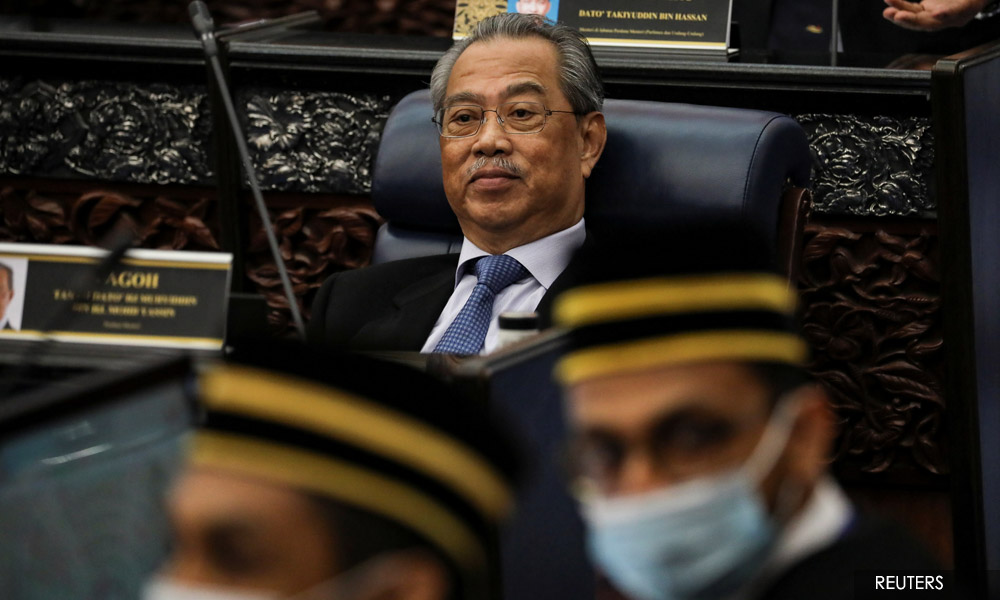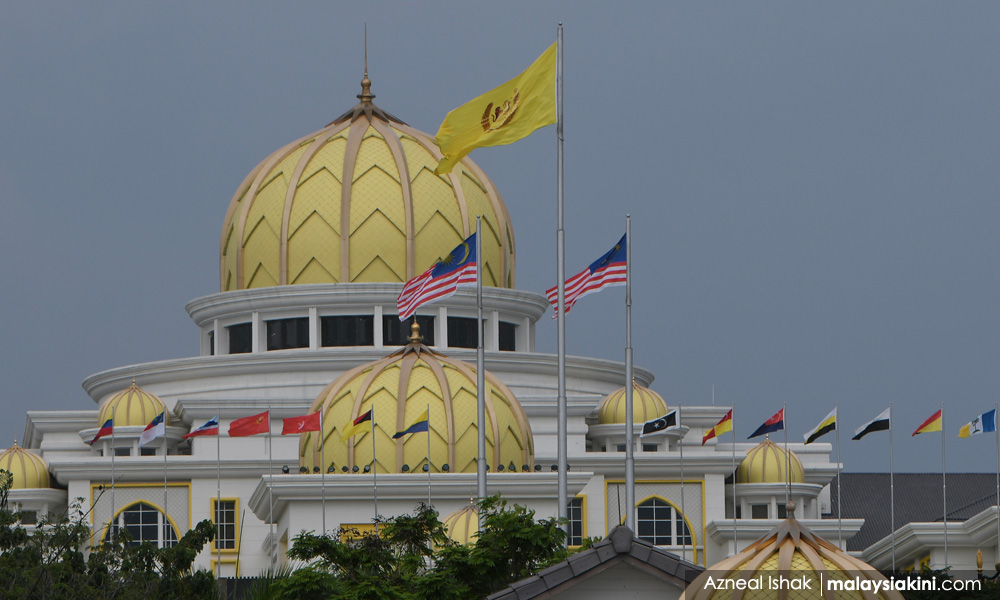Whereas previously I was watching on the sidelines, now the effect of the Sheraton Move was thrust on me in the Speaker’s Office. I had to make the first in a series of hard decisions.
After careful consideration and a lot of soul-searching, I decided to reject the Interim Prime Minister’s representation because in my opinion the representation and request for the special sitting did not comply with the requirements of Standing Order 11(3).
The “business set down for the day”, in the words of the rule, had not been included in the representation. There was no proposed motion to be considered and decided. To my mind, “a matter of national interest” was just too vague.
Was the Dewan to be convened to decide on who should be the new Prime Minister? What would the motion sound like? Would it be right to accept such a motion and to direct a special meeting be convened when the Agong was still in the process of deciding who in His Majesty’s judgment was the person likely to command the confidence of the majority of the members of the House?
If the Speaker had accepted the representation and proceeded to direct the convening of the special meeting as requested by the Prime Minister, would it not offend or conflict with the constitutional rule and principle that in matters concerning the appointment of the Prime Minister, it is the Agong as the Head of State who has the authority to decide?
Would it not usher in another constitutional crisis, pitting the Dewan Rakyat against the Palace? If I as Speaker were to blindly follow the dictate of the Prime Minister and the Government even though the agenda for the special sitting would offend the Federal Constitution, would it be right in view of my oath of office to abide by and protect the Constitution?
Is it within the scheme of the Federal Constitution that the Speaker is to be treated as a mere adjunct of The Executive and has to comply with the requests of the Prime Minister under Standing Order 11(3) without question?
And finally, were the Members of the House in favour of the special sitting to decide on who should be the new Prime Minister when the Agong had not even decided? I can state with certainty the PH top leaders were not happy with having the special sitting in these circumstances. They told me so.

I have earlier in this book briefly touched on my approach to the law. I am not one who will read the words in the rules without context and purpose. I am not a simplistic literalist. Had I been one and reading the words as words in Standing Order 11(3), I could have conveniently reached the conclusion that I had absolutely no discretion and must follow the dictates of The Executive, no matter what.
To those who have criticised my decision saying I should have known better as a constitutional lawyer, or even that I was being “pompous”, I offer no apologies, regrets, afterthoughts, revisions or self-criticisms whatsoever.
There are a number of other pertinent facts that could complete the narrative, but I feel I ought not to disclose them because they were said to me in confidence and furthermore, they touch on the Attorney-General’s Chambers and the Palace. Those who know will know. There is no need for me to be adventurous.
I have also analysed this decision of mine more legalistically in the concluding chapter of Law Principles and Practice in the Dewan Rakyat (House of Representatives) of Malaysia. I produce an excerpt below:
"If it was suggested that the Dewan Rakyat had jurisdiction to decide who should be the Prime Minister at the outset, this would obviously be wrong constitutionally. There is an agreed order in a Westminster-type Constitution. It lies within the prerogative of the Head of State to appoint a Prime Minister who is a member of the elected legislature who, in the judgment of the Head of State, is a member likely to command the confidence of a majority of the Members of the legislature. The Malaysian Constitution is no different.
“In the normal run of cases, the choice can be expected to be straightforward: the leader of the majority Party should be chosen. The matter becomes difficult when a General Election fails to produce a clear majority Party or when the Prime Minister resigns in between General Elections or, in the case of Malaysia, when there are crossovers from the government benches to the opposition and the political realignments may not produce a clear majority government."
I added further:
"In these scenarios, there is no question that the appointing authority resides in the Head of State, not the legislature. This is not to say that the legislature may not have a subsequent legitimating function when a majority government may be made subject to a subsequent motion of either confidence or no-confidence, as the case may be, on the floor of the House."
What the special session wanted to achieve was essentially to put the cart before the horse.
Friday, 28 February 2020
The Palace issued a statement that the Agong had not as yet been able to determine who was likely to command the confidence of the majority, and therefore the Agong would strive to find a solution consistent with the Federal Constitution.

The Agong would be meeting with the leaders of the Parties for them to nominate the name of the member of the Dewan Rakyat proposed as Prime Minister.
The statement from the Palace said, "Berdasarkan proses temu bual ini, Seri Paduka Baginda masih belum memperolehi keyakinan mengenai seorang Ahli Dewan yang pada hemat Baginda mendapat kepercayaan majority Ahli-Ahli Dewan Rakyat bagi membentuk kerajaan baharu.
“Pihak Istana Negara akan berhubung dengan Ketua- Ketua pimpinan parti politik yang mempunyai wakil dalam Dewan Rakyat, bagi memberi peluang kepada mereka untuk mengemukakan pencalonan nama Ahli Dewan Rakyat sebagai bakal Perdana Menteri."
Before the statement was issued, I was summoned to the Palace in the morning to brief the Agong on the status of the request for the special sitting. I conveyed my decision to reject the request; I would be issuing my reply and a media statement from the Speaker’s Office immediately after the audience with the Agong.
Thus, in the Palace’s media statement it was stated “Seri Paduka Baginda juga turut berkenan dengan keputusan yang telah diambil oleh YB Yang di-Pertua Dewan Rakyat untuk tidak memanggil Mesyuarat Khas Dewan Rakyat pada Isnin 2 Mac 2020”.
The Majlis Raja-Raja had its meeting in the morning. I was at the Istana again after the Friday prayers to brief and explain to several of Their Highnesses the reason for my rejection of the representation under Standing Order 11(3).
Saturday, 29 February 2020
The Agong met with the Party heads and independent Members of Parliament. Based on Article 40(2)(a) and Article 43(2)(a) of the Constitution, the Agong came to a decision and consented to the appointment of Muhyiddin as the new Prime Minister of Malaysia.
Through a media statement, the Palace announced that the swearing-in ceremony was fixed for Sunday 1 March 2020.
The public has no means of knowing how the numbers stacked up. The audience with the Agong and the process of selection were made highly confidential. From my sources, it was confirmed Muhyiddin had the majority. Given the confidentiality, I cannot say more.
As I argued earlier in this Chapter, the full story has yet to be told by the principal actors. I make no value judgments on them until then. My role in the Sheraton Move episode was a mere side-story. I was later to suffer the same fate as the PH Government since within four months I was to lose my position. That narrative will be told in the subsequent chapters.
So, ultimately the Government that had secured the people’s mandate through a legitimate General Election was defeated by crossovers. The speed of the change was unprecedented and almost surreal. Many were left lamenting what the point was of them voting in the General Election if their voice could so easily be subverted by political ‘frogging’.
Why should the law and the Constitution allow and tolerate such undemocratic usurpation of power? The appointment of the Prime Minister by the Agong, to be fair, was constitutional in the formal, legalistic sense, but it did not seem right to many for the PH Coalition Government to be replaced by an Opposition coalition that had failed to secure the majority mandate of the people in the first place.
The winner lost, but the loser won. That was the stark reality. As subsequent events will show, the Sheraton Move did not result in political stability. Just 17 months later, The PN Government under Muhyiddin itself fell on 16 August 2021.
This is an excerpt from Mohamad Ariff Md Yusof's new book titled "Parliament, Unexpected?", a reflection on his time as the Dewan Rakyat speaker.
- Mkini




No comments:
Post a Comment
Note: Only a member of this blog may post a comment.